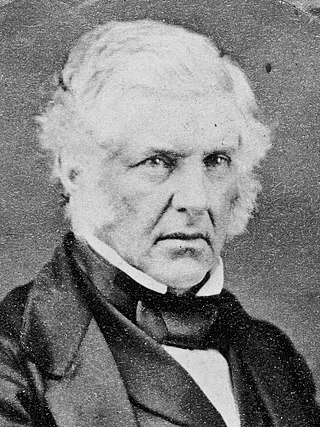Related Research Articles
The First Taranaki War was an armed conflict over land ownership and sovereignty that took place between Māori and the Colony of New Zealand in the Taranaki region of New Zealand's North Island from March 1860 to March 1861.
William Morgan Crompton was a New Zealand politician.
The 2nd New Zealand Parliament was a term of the Parliament of New Zealand. It opened on 15 April 1856, following New Zealand's 1855 election. It was dissolved on 5 November 1860 in preparation for 1860–61 election. The 2nd Parliament was the first under which New Zealand had responsible government, meaning that unlike previously, the Cabinet was chosen by Parliament rather than by the Governor-General of New Zealand.
Charles Brown was a New Zealand politician from the Taranaki area.
Alfred William East was a New Zealand politician. He represented the Omata electorate on the Taranaki Provincial Council from 5 November 1855 to 13 December 1856. He represented the Omata electorate in the 2nd New Zealand Parliament from 1855, but resigned in March 1860 at the outbreak of the First Taranaki War before the end of his term when he accepted a government appointment. He left Taranaki at that time. He did not serve in any subsequent Parliaments. In the resulting by-election, James Crowe Richmond was returned unopposed.
William Odgers VC was a Royal Navy sailor and a recipient of the Victoria Cross, the highest award for gallantry in the face of the enemy that can be awarded to British and Commonwealth forces.
Charles Stuart Curtis was a storekeeper and local politician in Taranaki, New Zealand, and played a leading role in the development of the town of Stratford.

James Crowe Richmond was a New Zealand politician, engineer, and an early painter in watercolours of the New Zealand landscape.

Omata is a locality in Taranaki, in the western North Island of New Zealand. It is located on State Highway 45 just southwest of New Plymouth. Omata and Western New Plymouth are adjacent to the Tapuae Marine Reserve.

Frederic Alonzo Carrington was a 19th-century New Zealand politician and surveyor. He is regarded as the Father of New Plymouth.
Omata was a New Zealand electorate. It was located in Taranaki and based on the township of Omata. One of the original 24 electorates, it existed from 1853 to 1870.
Grey and Bell was a Taranaki electorate in the New Zealand Parliament from 1853 to 1881.
Wanganui and Rangitikei was a parliamentary electorate that existed from 1853 to 1860, represented by two Members of Parliament.

Henry Brown JP was an independent conservative Member of Parliament in New Zealand. He was a prominent saw miller in the Taranaki Region.

Arthur Samuel Atkinson was a 19th-century Member of Parliament from the Taranaki Region, New Zealand.
Francis Joseph Mace was a Taranaki settler whose exploits during the Taranaki Wars earned him much praise. Chief among his awards was the New Zealand Cross, the highest colonial gallantry award available in New Zealand.

The 1865 Town of New Plymouth by-election was a by-election held in the Town of New Plymouth electorate during the 3rd New Zealand Parliament, on 19 May 1865. The by-election was caused by the resignation of the incumbent, Charles Brown, and was won unopposed by Henry Sewell. Whilst Sewell was not a local resident, he was a member of the government through his appointment to the Legislative Council, the upper house of Parliament. Sewell accepted the invitation to represent the electorate, as him becoming a member of the lower house was seen to strengthen the government.
The 1865 Omata by-election was a by-election held on 18 July in the Omata electorate in Taranaki during the 3rd New Zealand Parliament.
The 1868 Omata by-election was a by-election held on 7 February in the Omata electorate in Taranaki during the 4th New Zealand Parliament.
The 1870 Omata by-election was a by-election held on 27 April in the Omata electorate during the 4th New Zealand Parliament.
References
- ↑ "Election". Taranaki Herald. 21 April 1860.